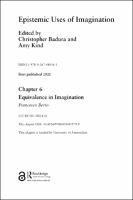Chapter 6 Equivalence in Imagination
Proposal review
| dc.contributor.author | Berto, Francesco | |
| dc.date.accessioned | 2022-08-08T12:38:08Z | |
| dc.date.available | 2022-08-08T12:38:08Z | |
| dc.date.issued | 2021 | |
| dc.identifier.uri | https://library.oapen.org/handle/20.500.12657/57845 | |
| dc.description.abstract | Ch. 6: One sense of imagination that matters in epistemology has the word mean reality-oriented mental simulation (ROMS): we suppose that something is the case, develop the supposition by importing background knowledge and beliefs, and check what is true in the imagined scenario. What is the logic of ROMS? Imagination has a reputation for being logically anarchic. In particular, it s hyperintensional: we can imagine A without imagining a necessarily equivalent B. This work considers a Principle of Equivalence in Imagination which, if accepted, will limit the anarchy: when A and B are equivalent in imagination, one will imagine the same things after supposing either in ROMS. What is equivalence in imagination? It is suggested that it s cognitive equivalence. A and B are cognitively equivalent for one when they play the same role in one s cognitive life: whatever one understands, concludes, etc., given either, one does, given the other. ROMS is logically modelled via variably strict modals. Two formal semantics are proposed for them: one uses possible worlds plus an algebra of topics; the other resorts to impossible worlds. The two deal with equivalence in imagination in subtly different ways. | en_US |
| dc.language | English | en_US |
| dc.subject.classification | thema EDItEUR::Q Philosophy and Religion::QD Philosophy::QDT Topics in philosophy::QDTK Philosophy: epistemology and theory of knowledge | en_US |
| dc.subject.classification | thema EDItEUR::Q Philosophy and Religion::QD Philosophy::QDT Topics in philosophy::QDTM Philosophy of mind | en_US |
| dc.subject.other | equivalence, imagination, reality-oriented mental, simulation | en_US |
| dc.title | Chapter 6 Equivalence in Imagination | en_US |
| dc.type | chapter | |
| oapen.identifier.doi | 10.4324/9781003041979–9 | en_US |
| oapen.relation.isPublishedBy | 7b3c7b10-5b1e-40b3-860e-c6dd5197f0bb | en_US |
| oapen.relation.isPartOfBook | a96255d3-25ea-4ce3-bfad-49f673d26df8 | en_US |
| oapen.relation.isFundedBy | d94bb91a-b658-466f-b219-dc59e8220efa | en_US |
| oapen.relation.isbn | 9781032018935 | en_US |
| oapen.relation.isbn | 9780367480561 | en_US |
| oapen.imprint | Routledge | en_US |
| oapen.pages | 20 | en_US |
| oapen.remark.public | Funder name: University of Amsterdam | |
| peerreview.anonymity | Single-anonymised | |
| peerreview.id | bc80075c-96cc-4740-a9f3-a234bc2598f1 | |
| peerreview.open.review | No | |
| peerreview.publish.responsibility | Publisher | |
| peerreview.review.stage | Pre-publication | |
| peerreview.review.type | Proposal | |
| peerreview.reviewer.type | Internal editor | |
| peerreview.reviewer.type | External peer reviewer | |
| peerreview.title | Proposal review | |
| oapen.review.comments | Taylor & Francis open access titles are reviewed as a minimum at proposal stage by at least two external peer reviewers and an internal editor (additional reviews may be sought and additional content reviewed as required). |

